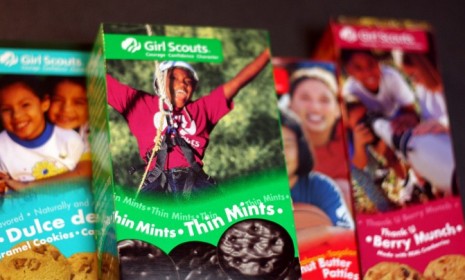The Girl Scout Cookie lie: No trans-fats
The cookies' labels give the impression the time-honored treat is healthier than it is — and health advocates are not happy

A free daily email with the biggest news stories of the day – and the best features from TheWeek.com
You are now subscribed
Your newsletter sign-up was successful
The Girl Scouts advertise their famous cookies as being free of trans fats, the unsaturated, artificially produced oils that health officials warn against. But in fact, says Chicago Tribune, the three most popular varieties of the cookies — Samoas, Tagalongs, and Thin Mints — do contain a moderate helping of the "artery-clogging" substance. The Girl Scouts can label their boxes "0 grams trans fat" anyway because of a loophole in Food and Drug Administration rules. Of course, the Scouts aren't the only ones — Chips Ahoy, Nilla Wafers, and Nutter Butters, for example, also contain some partially hydrogenated oils but claim to have zero trans fats. How much trans fat are you unknowingly ingesting? Here, a guide:
What is the FDA policy?
As long as a food contains less than 0.5 grams of trans fat per serving, the FDA allows its maker to label it as having no trans fat at all, a loophole detailed in a new article by medical student Eric Brandt in the American Journal of Health Promotion. This means, says Science Blog, that products that appear healthy could have "a significant amount of trans fat that can exceed recommended limits and potentially lead to various adverse health effects." And since the daily recommended intake of trans fats is 1.11 grams, "one would only need to consume a few deceptively labeled trans fat foods to exceed the healthy recommended intake."
The Week
Escape your echo chamber. Get the facts behind the news, plus analysis from multiple perspectives.

Sign up for The Week's Free Newsletters
From our morning news briefing to a weekly Good News Newsletter, get the best of The Week delivered directly to your inbox.
From our morning news briefing to a weekly Good News Newsletter, get the best of The Week delivered directly to your inbox.
How bad are trans fats?
"Trans fats are considered by many nutrition researchers to be the worst kind of dietary fat," says Deborah Kotz at Boston.com. They raise "bad" cholesterol levels and "increase inflammation, which has been linked to heart disease, diabetes, and cancer." In a "landmark" 2006 study, researchers found that increasing the daily intake of trans fats from one percent of caloric intake to two percent (in other words, from about two grams of fat to four) increased the risk of heart attack by 30 percent.
Will the labeling change?
Brandt's study appears to have attracted the attention of health officials. In a statement responding to its findings, the FDA said it agreed that "trans fat intake should be limited as much as possible," and that it is "currently assessing" ways to limit trans fats, now that they can be detected "at concentrations lower than 0.5 grams." As for the Girl Scouts, a spokeswoman would not reveal how much fat is in each cookie, but said, "we know that our girls are selling a beloved American treat that is to be enjoyed in moderation."
A free daily email with the biggest news stories of the day – and the best features from TheWeek.com
Sources: Chicago Tribune, Boston.com, Science Blog
-
 The ‘ravenous’ demand for Cornish minerals
The ‘ravenous’ demand for Cornish mineralsUnder the Radar Growing need for critical minerals to power tech has intensified ‘appetite’ for lithium, which could be a ‘huge boon’ for local economy
-
 Why are election experts taking Trump’s midterm threats seriously?
Why are election experts taking Trump’s midterm threats seriously?IN THE SPOTLIGHT As the president muses about polling place deployments and a centralized electoral system aimed at one-party control, lawmakers are taking this administration at its word
-
 ‘Restaurateurs have become millionaires’
‘Restaurateurs have become millionaires’Instant Opinion Opinion, comment and editorials of the day